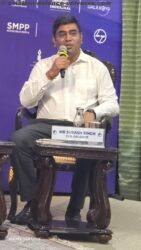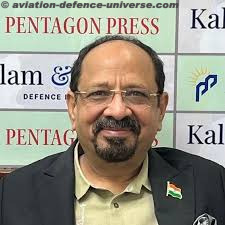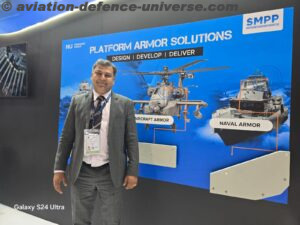
New Delhi. 07 October 2019. ” Boeing has been a strong partner of India’s aerospace sector for over 75 years now. We are proud that the Indian armed forces have chosen us as a partner in their modernization journey. We have had several milestones in 2019 with the delivery of the first batch of AH-64E Apache, the CH-47(I) Chinook helicopters and the 11th C-17 Globemaster to the Indian Air Force,” said Surendra Ahuja, Managing Director, Boeing Defense India, in an exclusive interview with Aviation & Defence Universe (ADU) reminiscing Boeing’s longstanding relationship with India .
ADU. Congratulations on your appointment as MD BDI. What are your short and long term plans to keep the focus strong on the defence business?
SA. Thank you. I’m very excited to be in Boeing at a time when our investments in India are taking the tangible shape that we have been working towards over the last few years. We are excited to see India thrive with the latest and most advanced Boeing products. Our objective is to bring the very best of Boeing to India and the very best of India to Boeing.
We are also ensuring the high availability of platforms to Boeing customers for missions at competitive costs. Executing on commitments to customers on schedule and cost is our number one priority. Our people, products and services are committed to support the Indian armed forces to protect the country, and will continue to do so in the future.
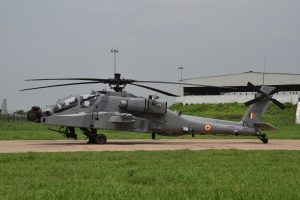
ADU. What is the strategy to improve Services and Maintenance for Boeing products in India? Is there a global strategy for it?
SA. Boeing values India as a key aerospace market and is committed to enhancing our footprint and long-standing relationship with the Indian government and industry. We are playing an important role in the mission readiness and modernization of India’s defense forces. The pace and depth of our engagement through products, services and partnerships have increased significantly in recent years.
Boeing’s investments in services infrastructure, the build-up of local capability and workforce and local partnership models is accelerating our strategy. Boeing Defence India is a local entity that provides holistic lifecycle solutions for government and defence customers in India and ensures the high availability of platforms to Boeing customers for missions at competitive costs.
We are working with the Indian Air Force and Indian Navy to provide exceptional operational capability and readiness for Boeing aircraft such as the P-8I, C-17 and the Head of State. The P-8I and C-17 have demonstrated an excellent record in supporting the missions they have been deployed for and the forces have expressed satisfaction about their operational readiness. Besides their military roles, both aircraft have also been at the forefront of rescue and humanitarian aid efforts.
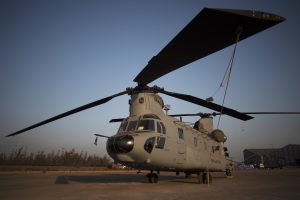
Boeing has been maintaining IAF’s C-17 fleet through techno-logistics support and training for aircrew that operate the platform. The C-17 fleet has maintained high serviceability rates since its induction. Boeing is responsible for maintenance, field support services, modifications and upgrades, technical manual support and logistics engineering services.
Boeing’s C-17 simulator training centre, established in 2016, provides training services to the IAF, and has completed over 5100 hours of training for aircrew and loadmasters. The centre has also maintained a serviceability state of nearly 100 percent since its inception.
India’s P-8I fleet has surpassed over 22,000 flight hours since its induction. Boeing supports India’s P-8I fleet by providing spares, ground support equipment and field service representative support.
ADU. Has Make in India been helpful to Boeing in creating a credible, globally competitive industrial base and if so how?
SA. Make in India is a core element of Boeing’s business strategy to ensure that aircraft built in India are delivered to Indian customers on schedule, competitive costs and with flawless quality. The extensive expertise we have in growing the supplier base in India, nurturing innovation, establishing skills development centers and joint ventures for aerospace manufacturing is helping us build a strong and indigenous ecosystem in the country.
For India, Boeing has identified six key enablers that will be essential for success: world-class infrastructure, a thriving Indian supplier base, innovation, support and sustainment, engineering talent development and skills advancement in the country.
Building a competitive aerospace industrial capability takes time and investment. Today, Boeing sources close to USD 1 billion annually from India. Over 160 Indian suppliers continue to provide parts and assemblies covering aerostructures, wire harnesses, composites, forgings, avionics mission systems, and ground support equipment.
In addition, Boeing is making the largest investment outside the United States in the course of its 100-year history with our rapidly growing Boeing India Engineering & Technology Center in Bengaluru. The Center is leveraging a talented pool of employees to support Boeing’s worldwide engineering, R&D, IT and data analytics growth, and engineers undertake high-quality, advanced aerospace work.
For our Indian customers, the capacity and capability that Boeing has developed in India helps immensely. ‘Make in India’ is a choice we have made for the long term. Setting up a manufacturing and supply chain footprint here helps. We are able to leverage the best engineering talent available and further, a globally competitive manufacturing and supply base helps us get more competitive. Local presence also helps us to participate in the local market opportunities.
ADU. Has Make in India been helpful to Boeing in creating a credible, globally competitive industrial base and if so how?
SA. Make in India is a core element of Boeing’s business strategy to ensure that aircraft built in India are delivered to Indian customers on schedule, competitive costs and with flawless quality. The extensive expertise we have in growing the supplier base in India, nurturing innovation, establishing skills development centers and joint ventures for aerospace manufacturing is helping us build a strong and indigenous ecosystem in the country.

For India, Boeing has identified six key enablers that will be essential for success: world-class infrastructure, a thriving Indian supplier base, innovation, support and sustainment, engineering talent development and skills advancement in the country.
Building a competitive aerospace industrial capability takes time and investment. Today, Boeing sources close to USD 1 billion annually from India. Over 160 Indian suppliers continue to provide parts and assemblies covering aerostructures, wire harnesses, composites, forgings, avionics mission systems, and ground support equipment.
In addition, Boeing is making the largest investment outside the United States in the course of its 100-year history with our rapidly growing Boeing India Engineering & Technology Center in Bengaluru. The Center is leveraging a talented pool of employees to support Boeing’s worldwide engineering, R&D, IT and data analytics growth, and engineers undertake high-quality, advanced aerospace work.
SA. Boeing is accelerating its manufacturing, skill development and engineering involvement in India, forging the way toward building a strong and indigenous ecosystem in support of ‘Make in India.’ We are focused on our Indian partnerships to fully harness productivity opportunities here.
Boeing’s industrial partners in India are already raising the bar to deliver world-class quality, cost-efficiency and productivity as they become an important part of the company’s worldwide supply chain for some of the most advanced aircraft in the world.
For instance, Tata Boeing Aerospace Limited, Boeing’s joint venture with Tata Advanced Systems Limited, is already delivering Apache fuselages globally.
Dynamatic Technologies manufactures the ramp and complex aft pylon for the Chinook heavy-lift helicopters. Last year they celebrated the delivery of the 75th aft pylon and cargo ramp components for the Chinook.
Other success stories include TAL Manufacturing Solutions Ltd. who manufactures complex floor beams for the 787-9 and 787-10 Dreamliner and recently delivered the 20,000th advanced composite floor beam to Boeing. Rossell Techsys, a long-standing Boeing supplier in India, who recently delivered the 15,000th wire harness to Boeing for the AH-64 Apache, the 2000th harness for V-22 Osprey, and 1500th wire harness and 1000th electrical panel for AH-64 Apache.
We’re proud of our suppliers and they are valued partners as we jointly work towards creating an indigenous aerospace ecosystem.
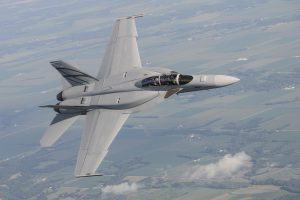
ADU. What are the next generation technologies on the Boeing F/A-18 Super Hornet, making it relevant for India?
SA. The Boeing F/A-18 Super Hornet is the frontline multi-role fighter of armed forces around the world. It is combat-proven with a defined technology plan to outpace future threats. The Super Hornet serves as the frontline fighter for the U.S. Navy and will continue to do so for decades to come.
With the Super Hornet, India would not only get the most advanced and lethal platform but also benefit from training, tactics, upgrades and knowledge related to the U.S. naval aviation ecosystem. F/A-18 Block III Super Hornet represents some revolutionary capabilities including longer range, improved stealth performance, data fusion, conformal fuel tanks, integrating new sensors, enhanced situational awareness with a new advanced cockpit system, reduced radar signature and a 10,000+ hour life. The operating cost of the Super Hornet is the lowest among all the U.S. tactical fighters. The U.S. Navy’s Super Hornet recently surpassed an 80% mission capability rate, a key metric to determine the health of a flying squadron’s aircraft. Boeing, in partnership with the Indian industry, seeks to provide sustainment solution throughout the lifecycle of the aircraft to support mission readiness.
ADU. Does Boeing have an existing strategy for its Space business in India and collaboration with ISRO?
SA. We’re proud of India’s recent great strides in space exploration and ambitions towards human space flights by end of 2021. It is a testimony to India’s innovation, determination and full embrace of the challenges of space. Boeing with our six decades of space experience can be inspired by what India has achieved and its very attainable aspirations for the future.
This is also a big year for Boeing in space. Very soon we will launch the first test mission for Boeing’s Starliner capsule, opening a new era of commercial space transportation to low-Earth orbit. In December we will deliver the first core stage for the Space Launch System, the rocket that will return astronauts to the moon and, ultimately, on to Mars. November marks the beginning of the 20th year of continuous human presence on orbit aboard the International Space Station. With our NASA partner, Boeing built and has sustained the ISS throughout its history and we are confident of supporting continued global presence on the station for more than a decade to come.
Beyond these milestones at the core of our space portfolio, we continue to be a global leader in satellite design and manufacture. Just last month in Paris we introduced our versatile 702X satellite. We are also investing in space technology innovation that will help drive future exploration and the development of a commercial space ecosystem. And we believe strongly that international collaboration with other spacefaring nations and their industries will be imperative to success. We look forward to partnering with ISRO in their endeavours.
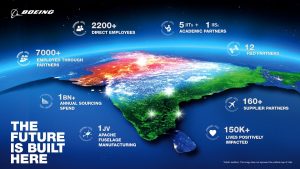
ADU. What are the plans Boeing has to improve its research & development in India? Keeping Make in India in mind how do you plan to solve the problem of lack of skills in India?
SA. Boeing is playing a critical role in inspiring the next generation of aerospace engineering talent in India and across the world. We are committed to cultivating innovation and skill development in India by leveraging India’s engineering talent, which has been a huge benefit as Boeing India continues to expand. Boeing has a long-standing presence of research and development in India dating back to 1995.
Our engineering centres in Bengaluru and Chennai are growing rapidly to support Boeing’s worldwide engineering, R&D, IT, data analytics and avionics growth. Boeing engineers in India undertake high-quality, advanced aerospace work.
We also believe that a close partnership with India’s academia and growing entrepreneurial ecosystem has the potential to help re-imagine the future of aerospace for the world. For instance, the start-up ecosystem has never been more vibrant than now. We recently launched a universities-focused innovation program called Boeing University Innovation Leadership Development (BUILD) to develop aerospace entrepreneurs. The BUILD program helped innovators convert their ideas into viable business offerings that have the potential to shape the future of Indian aerospace and defence. We offer students learning opportunities, provide learning resources and subject matter experts mentor these youngsters through the learning programme. The new generation has some disruptive ideas and it is fun learning from them.
Similarly, our flagship program, the Boeing HorizonX India Innovation Challenge is aimed at attracting the best Indian start-ups to propose disruptive solutions to tackle complex challenges in the areas of autonomous and unmanned systems, advanced manufacturing, industrial IOT and automation, analytics, artificial intelligence and machine learning.
We have collaborated with top institutions including the IITs, Nettur Technical Training Foundation, and National Centre for Aerospace Innovation and Research (NCAIR), among others, to create opportunities to build talent. Boeing’s work with NCAIR, a collaboration with IIT Bombay and the Department of Science and Technology has led to 40 patents and technology breakthroughs. More than 200 specialists have been trained and developed by the NCAIR.
Our partnership with Air India Engineering Services Limited and the Ministry of Civil Aviation, launched the Accelerated Apprenticeship Program for aircraft maintenance engineers. The key objectives of the program are to train aircraft maintenance engineers and improve their employability.
We invest in an externship program with IITs and top engineering colleges every year to select students to work with our industry partner Cyient. The program introduces students to world-class aerospace engineering projects and related best practices, thus resulting in high-tech career paths for talented students. The annual Boeing-IIT National Aeromodelling Competition for engineering universities across India is now in its sixth year and saw more than 1000 participants participate from over 250 educational institutions in 2019.
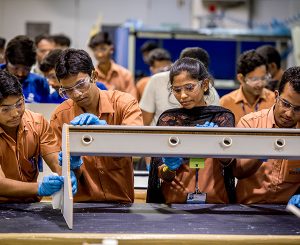
We have collaborated with the Nettur Technical Training Foundation to provide vocational training to Indian students and industry. Boeing-funded curriculums and initiatives with our partners such as Rossell Techsys, TAML, Jaivel and Lakshmi Machine Works are training workers on aerospace-relevant skills.
Students will form the next generation of leaders for aerospace. Boeing is focused on playing a key role in moulding and inspiring the next generation of engineering talent in India through internships, externships, apprenticeship programs and competitions. We’re helping bring passion to aerospace!







































